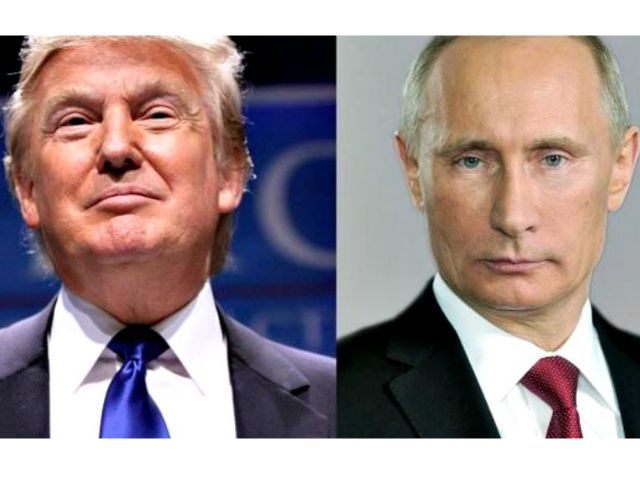Before taking the California stage last night, Donald Trump promised he would attempt to “tone it down” for the second Republican debate. He mostly failed to be less Trump than his usual disposition, save for one topic: the ongoing civil war in Syria and Russian President Vladimir Putin’s role in keeping the war alive.
Putin has been a looming presence in American foreign policy for the better of a decade, but he has arguably never been more relevant to a growing number of international crises. Most recently, Putin has begun setting up an air base in Syria, and significantly reinforcing the Syrian military in the hopes of keeping Syrian President Bashar al-Assad in power as he struggles to keep the Islamic State out of Damascus.
Asked directly whether Trump would dialogue with Putin, he said yes. “I would talk to him. I would get along with him. I believe — and I may be wrong, in which case I’d probably have to take a different path, but I would get along with a lot of the world leaders that this country is not getting along with,” Trump responded. “I will get along, I think, with Putin.”
Trump also balked at the idea of the United States having any role to play in Syria at all. “You look at what’s going on with ISIS in there, now think of this: we’re fighting ISIS. ISIS wants to fight Syria. Why are we fighting ISIS in Syria? Let them fight each other and pick up the remnants,” he stated.
Later in the debate, when the topic of Syria reared its head once more, Trump asserted that he would have never “drawn the [red] line” that President Obama had with Assad: do not use chemical weapons, or there will be unspecified consequences. Those consequences never materialized, and now reports indicate both Assad and Islamic State elements are using chemical weapons in Syria.
There was none of the traditional macho bluster to this answer, towards Assad or Putin. Trump apparently decided to save his tougher stance for more dangerous rivals than Putin, like Rand Paul. The irony in this, of course, being that the Kentucky Senator sounded a lot more like Trump on the Syria issue than anyone else. “Had we bombed Assad at the time, like President Obama wanted, and like Hillary Clinton wanted and many Republicans wanted, I think ISIS would be in Damascus today,” Sen. Paul warned of any plan to intervene in Syria before the expansion of ISIS that has largely disabled Assad’s army. Of Putin, Sen. Paul said: “Carly Fiorina also said we’re not going to talk with Putin. Well, think if Reagan had said that during the Cold War? We continued to talk with the Russians throughout the Cold War, which is much more significant than where we are now.”
Talking to Putin and keeping out of Syria are not new ideas. In fact, one of President Obama’s first foreign policy decisions in 2009 was to reestablish diplomatic relations with Assad, appointing Robert Ford in 2010 as America’s ambassador to Damascus, the first since 2005. Before that, President Obama’s State Department began experimenting with ways to navigate around Congress-imposed sanctions on Assad. “We are going to look at these waivers, especially on airplane spare parts, and our predisposition is going to be, view them favorably, as opposed to the prior administration’s policy,” one administration official told the New York Times about Assad in July 2009.
When it became no longer possible to ignore the problem as Assad violently repressed, the Obama administration kicked into high gear, imposing the sanctions they had previously attempted to thwart him and taking the time to curry the favor of the international community before drawing up that red line. Once the red line was drawn, the Obama administration sat idly by as Assad crossed it. Contrast this with the immediate repudiation of American ally Hosni Mubarak in Egypt, upon the arrival of the so-called “Arab Spring.”
As for actual military action in Syria, Politico explains how President Obama avoided engaging in any of it while pretending to try to make it happen:
First, Obama deferred the decision on whether to wage punitive airstrikes to Congress. Then he sent high-ranking officials to Capitol Hill to sell this unloved policy of military intervention in a halfhearted and nothing-to-see-here manner, downplaying the effect that the mooted “unbelievably small” airstrikes, as Secretary of State John Kerry termed them, would have on the regime’s war-making ability. Finally, with the votes not forthcoming, the president scrapped the idea altogether in favor of an 11th-hour plan offered by Russian President Vladimir Putin to decommission Assad’s chemical stockpiles.
A Trump presidency would have gotten rid of the overtures, would not have pretended to care about Syria. It would have “let them fight each other,” offering not even the nominal resistance of the Obama administration to Putin’s intervention. It’s the kind of answer to be expected of GOP doves like Sen. Paul, but a bittersweet surprise from a man who once said, “I think if this country gets any kinder or gentler, it’s literally going to cease to exist.”

COMMENTS
Please let us know if you're having issues with commenting.